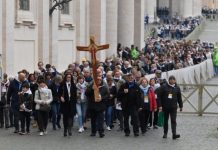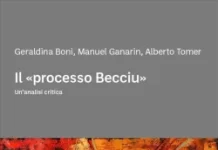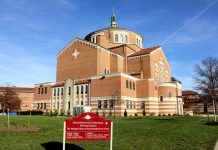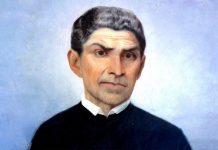The liturgy of this 30th Sunday in Ordinary Time shows us how prayer is indispensable in our lives. But, we must know how to ask.
Newsroom (October 25, 2021, 8:30 AM, Gaudium Press) Imagine this scene: a father, who has many possessions such as real estate, land, businesses, fortunes, and in addition- his most precious treasure – a united and very content family. He has a beloved son, whom he cares for to the extent that he desires to give him everything he owns. Many times he took his son to see his future treasures and possessions, to provide him the occasion to ask for what he wanted; but his son never asked.
Perplexed by this, the father wondered…
“Why does my son not ask me for anything? I have everything to offer him! It is true that after my death he will receive all of this as an inheritance, but I love him so deeply that I would like to give so much to him now, so that he may accumulate more treasures and thus increase what he will inherit from me. I could give him a great deal now and even more in the future!”
And the father waited, with holy anxiety, for the day when his son would say to him:
“Father, please, may I have some of your treasures now?”
This request would have been enough for him to receive everything in abundance!
So, who is this father? And who is this son?
Humility: predisposition to prayer
Can the most excellent of fathers, possessor of all imaginable riches and virtues, be compared to our heavenly Father who watches over each of us as if we were His only child? If we do not understand the attitude of this son who dares not ask anything of his father, so much more should we be surprised that we have God as our King and Father, and we do not ask Him for what He so desires to give us!
We see in today’s Gospel the healing of a blind man who received the gift of sight for a very simple reason: because he asked. But with how much determination?
At that time, Jesus went out from Jericho with his disciples and a large crowd. The son of Timaeus, Bartimaeus, who was blind and a beggar, was sitting by the roadside. When he heard that Jesus the Nazarene was passing by, he began to cry out, “Jesus, Son of David, have mercy on me!” (Mt 10:46-48).
Generally speaking, pride is one of the main obstacles that prevents a soul from making a petition. In fact, those who think they possess too much do not feel compelled to make a petition, since asking is an act of humility in which we lower ourselves and recognize our weaknesses. And when – though rarely – a proud man makes a request to his Creator, it is very difficult for it to be granted; not because God refuses to listen to him, but because his soul is not suited to receive the gifts of Heaven.
For the humble soul, however, asking God for something is very simple, because after all, He is our father. When the Creator sees a soul bow down before Him, His Heart is filled with so much love that He is almost “obliged” to answer. In fact, humility is the key to the Heart of God and allows us to obtain what we ask for. As St. John Maria Vianney says: “The first of the virtues is humility, the second is humility, the third is humility. Oh, what a beautiful virtue! The Saints thought they were nothing, but God esteemed them and granted them whatever they asked.”[1]
This is what we see in today’s Gospel. What does Bartimaeus say? Does he affirm his good qualities? Quite the contrary. He says: “Jesus, Son of David, have mercy on me” (Mt 10:47). “Have pity“… how rare it is to hear such words from presumptuous lips! Even rarer is it for the presumptuous to have their desires granted, or rather their ambitions. If this blind man had not been humble, he would not have asked, and he would not have been cured.
Faith: a guarantee of having our prayers heard
With humility, the soul is already predisposed to prayer and prepared to receive what it desires. However, Our Lord asks more of us. In order to be truly heard, He not only wants us to recognize our miseries, but also to trust in His power with an unshakeable faith. This is what Bartimaeus does in today’s Gospel:
Then Jesus asked him, “What do you want Me to do for you?” The blind man replied, “Master, that I may see!” Jesus said, “Go, your faith has healed you.” At the same instant, he regained his sight and followed Jesus on the road. (Mt 10, 51-52)
His request is categorical: “Domine, ut videam”[2] (“Lord, that I may see.”) These are the requests full of faith that move God. What is most striking is that Our Lord attributed the cure to the faith of the blind man: “Your faith has healed you” (Mt 10:52). It is not without reason that St. Thomas affirms that the Saviour made the miracles conditional on the faith – solid or weak – that He found in souls.
God rewards the insistent
There is another lesson in today’s Gospel: perseverance and insistence in prayer. Sometimes, God delays granting us what we desire in order to prove our perseverance. It is only natural that, if we received it immediately after asking, we would not give due value to the goods granted by God. It was such insistence that led Bartimaeus to be healed:
Many rebuked him to be silent. But he cried out all the more: “Son of David, have mercy on me!” (Mt 10:48)
Often the same thing happens to us: the more we ask, the more it seems that the world, temptations, our passions, and evil inclinations “rebuke us to be silent“. At this moment, let us not stop begging, but instead imitate Bartimaeus: let us cry out with even greater force: “Son of David, have mercy on me”. Without doubt, we will be heard!
So let us pray…but with humility, faith and insistence.
By Lucas Rezende
[1] FOURREY, René (Org.). Ce que prêchait le Curé d’Ars. Dijon: L’échelle de Jacob, 2009, p.267-268.
[2] From the Latin: “Lord, that I may see”.
[3] Cf. SAINT THOMAS DE AQUINO. Summa Theologica. III, q.43, a.2, ad 1.
Compiled by Sandra Chisholm


































